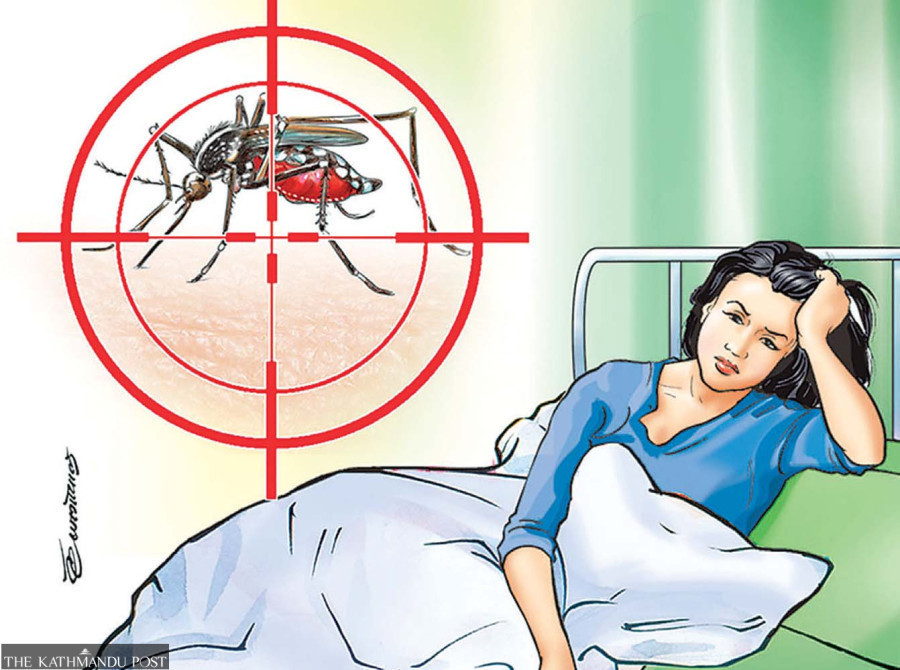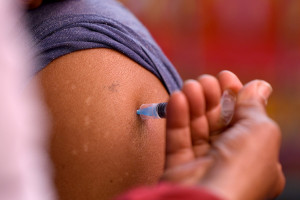Health
Kathmandu records 80 new dengue infections daily
This year, over two dozen people have died and more than 35,000 have been infected with the dengue virus.
Arjun Poudel
Dengue cases are surging in Kathmandu Valley again, with hospitals reporting an uptick in the number of new infections.
Doctors say the rapid increase in transmission right before Dashain is a matter of concern, as the outbreak could put a damper on the festival, especially since most health workers will also be on Dashain vacation.
“Lately, the number of positive cases is surging at an alarming rate,” said Dr Sher Bahadur Pun, chief of the Clinical Research Unit at Sukraraj Tropical and Infectious Disease Hospital. “Most patients recommended for dengue testing over the past few days have tested positive.”
This is a strong sign that the virus is spreading in the Valley again, he said.
Dengue is a viral disease, transmitted by the female Aedes aegypti and Aedes albopictus mosquitoes. The same vector also transmits chikungunya, yellow fever, and Zika virus, according to the World Health Organization.
According to the Health Office Kathmandu, around 70 to 80 people are testing positive for the virus every day. New cases have seen an alarming rise.
Sagar Ghimire, chief of the health office, said: “Although death and severity from the infection have not yet been reported in the district, that cannot be ruled out if the virus spread continues.”
The Health Office Lalitpur also said that the number of new dengue cases has risen of late. At least one person has died and 563 people have tested positive for the virus in the district so far.
“Around 40 dengue patients have been admitted to our hospital,” said Dr Ravi Shakya, director at Patan Hospital. “The increase in the number of patients, mostly from the Kathmandu Valley, indicates that the virus is spreading.”
What concerns health experts more is that no preventive measures against dengue infection have been taken by any agency in the Valley, which means infection of the virus could become widespread in the coming days. Some municipalities in the Kathmandu Valley had launched a dengue search and destroy drive after the start of the monsoon season, but stopped later.
Experts said the lackadaisical approach of the authorities is responsible for the spread of the dengue virus. They said measures such as search-and-destroy and awareness drives should be initiated to contain the spread of virus-spreading vectors.
At least two dozen deaths from dengue infection have been reported since the start of 2023. The Ministry of Health and Population, however, has confirmed only 20 deaths and around 35,000 infections from the virus, which has spread to 76 out of the 77 districts in the country.
“We are still verifying some deaths, reportedly from dengue infection,” said Dr Gokarna Dahal, chief of the Vector Control Section at the Epidemiology and Disease Control Division. “The number of deaths will rise if all reported deaths are confirmed to be from dengue.”
Public health experts suspect health authorities are understating the number of dengue deaths, as there have been reports of more casualties from several districts than what has been confirmed. They say the real number of infected persons could be several times higher as the government’s case reporting system is not effective and more than 80 percent cases are asymptomatic. Many people infected with dengue show mild symptoms and do not need any treatment or can be treated with paracetamol at home.
Last year, 88 persons died and more than 54,000 were infected by the virus, which had spread to all 77 districts. At the time, hospitals in Kathmandu Valley were overwhelmed with dengue patients and pharmacies had run out of paracetamol, the most widely used medicine to treat fever.
In 2019, the disease killed at least six people and more than 16,000 were hospitalised across the country. The virus had spread to 68 districts at the time.
Dengue-transmitting mosquitoes breed in clean water and bite people in daylight. Uncovered water tanks and other discarded objects such as plastic cups and bottles could provide breeding grounds for the dengue-carrying mosquitoes.
Symptoms of dengue include mild to high fever, severe muscle pain, rashes, severe headache and pain in the eyes, doctors say. Patients with these symptoms are advised to seek immediate treatment. While there is no specific cure for the disease, early detection and access to proper medical care can prevent death.
Epidemiologists as well as virologists said despite thousands of persons getting infected and scores dying from the disease, the authorities have not taken the matter seriously.




 19.2°C Kathmandu
19.2°C Kathmandu















